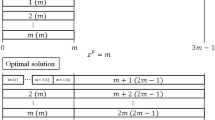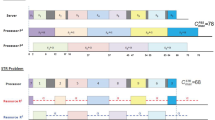Abstract
One of the well-studied models of combinatorial optimization is the scheduling problem dealing with a finite set of tasks, which have to be executed on a fixed number of machines so that a given objective is minimized. Each task requires a set of characteristic data like operating time, due date, penalty cost and technological requirements. An algebraic approach to the objective leads to a general problem which includes all classical cases of sum and bottleneck objectives known in literature. By solving an algebraic transportation problem a lower bound for the objective value can be determined. To obtain an optimal solution we employ a branch and bound procedure. Furthermore we consider the general job shop scheduling problem with algebraic objective function.
Zusammenfassung
Eines der am besten beschriebenen Modelle kombinatorischer Optimierung ist das Scheduling Problem, bei dem eine endliche Anzahl von Tätigkeiten auf einer festen Anzahl von Maschinen so ausgeführt werden muß, daß eine gegebene Zielfunktion minimiert wird. Jede Tätigkeit benötigt charakteristische Daten wie Bearbeitungszeit, Fertigsteillungstermin, Strafkosten und technologische Nachfolgebeziehungen. Ein algebraischer Ansatz für die Zielfunktion führt zu einem allgemeinen Problem, das alle in der Literatur bekannten klassischen Fälle von Summen und Maximum Zielfunktionen einschließt. Durch die Lösung eines algebraischen Transportproblems wird eine untere Schranke für den Zielfunktionswert bestimmt. Um eine Optimallösung zu erhalten, verwenden wir ein Branch and Bound Verfahren. Weiterhin betrachten wir das allgemeine Job Shop Scheduling Problem mit algebraischer Zielfunktion.
Similar content being viewed by others
References
Burkard, R. E.: A General Hungarian Method for the Algebraic Transportation Problem. Report 76-6, Mathematical Institute of the University of Cologne (1976).
Burkard, R. E., Hahn, W., Zimmermann, U.: An Algebraic Approach to Assignment Problems. Math. Progr.12, 318–327 (1977).
Burkard, R. E., Hamacher, H., Zimmermann, U.: Flußprobleme mit allgemeinen Kosten. In: Numerische Methoden bei Optimierungsaufgaben (Collatz, L., Meinardus, G., Wetterling, W., eds.), Vol. 3, pp. 9–22. Basel: Birkhäuser 1977.
Lawler, E. L.: On scheduling problems with deferral costs. Management. Science11, 280–288 (1964).
Rinnooy Kan, A. H. G.: Machine Scheduling Problems, pp. 16–24 and pp. 45–50. The Hague: Martinus Nijhoff 1976.
Scholz, K.: Zur Optimierung von Multi-Processor Systemen. Diploma, University of Cologne, 1977.
Ullman, J. D.: NP-complete scheduling problems. J. Comp. Sys. Sc.10, 384–393 (1975).
Author information
Authors and Affiliations
Rights and permissions
About this article
Cite this article
Scholz, K. On scheduling multi-processor systems with algebraic objectives. Computing 20, 189–205 (1978). https://doi.org/10.1007/BF02251945
Received:
Issue Date:
DOI: https://doi.org/10.1007/BF02251945




